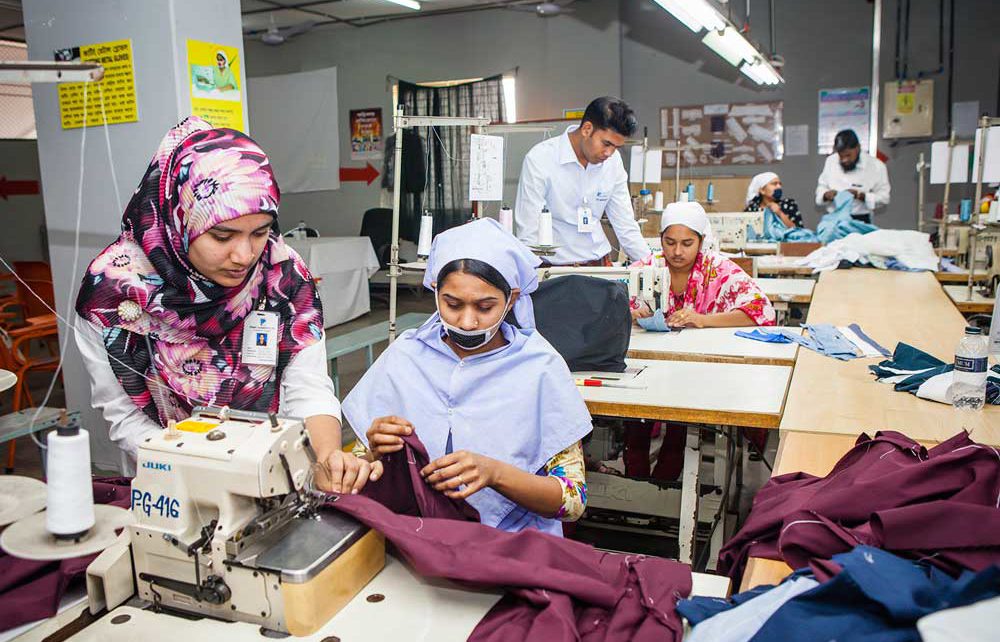Context: The youth unemployment rate in Bangladesh stands at 10.3 per cent, with significant gender differences: 6.2 per cent for men and 22.9 per cent for women. The rate of youth that are neither employed nor in education/training is 41 per cent, with a very high rate of 65.7 per cent for females, and for males a more modest rate of 12.7 per cent. Mismatches between the education system and the labour market mean that unemployment is higher among young persons with tertiary education (26.1 per cent) than among those with lower levels (12.3, 6.4 and 3.2 per cent for those with secondary, primary or less than primary education, respectively). A total of 62.1 per cent of employed youth are undereducated for their job, while only 2.9 per cent are deemed overeducated.
Entrepreneurial culture in Bangladesh is low and few young people coming out of education and training opt for self-employment. This problem is compounded by limited access to credit and advisory services for young entrepreneurs seeking to start a new business.
Implementation of programme/ initiative: The Skills and Employment Programme of Bangladesh (SEP-B), renamed as Sudokkho in 2016, aims at establishing integrated and market-driven skills training systems in Bangladesh through private-sector investment in technical and vocational education and training (TVET). Sudokkho interventions are tailored to the needs of employers in two key economic sectors with high potential to absorb a large number of unemployed youth, particularly women, in skilled and semi-skilled jobs: the ready-made garments and construction industries. Currently, the ready-made garment industry accounts for 76 per cent of Bangladeshi exports and over 70 per cent of workers in the sector are women, mainly young unmarried women.
The programme is structured around three components:
- Supporting private training providers to offer affordable quality training that enhances employability.
- Supporting private sector industries to develop and operate industry-led training facilities.
- Contributing to policies and developing skill training packages that meet the occupational training standards of the industry and can be used by the above-mentioned training systems.
Sudokkho partners with the private sector through a two-pronged approach: first, supporting private training providers (PTP) to offer affordable quality training that enhances employability, and second, supporting private sector industries to develop and operate industry-based training facilities (ITB). A central feature of the programme is the mainstreaming of gender equality and social inclusion in the development of private sector training market systems to ensure that women and disadvantaged groups gain the skills needed to obtain work.
The budget for the 5-year period between April 2014 and March 2019 totals GBP 22 million (USD 32 million) and is co-financed by UK Aid (through the Department for International Development, DFID) and the Swiss Agency for Development and Cooperation (SDC). The project is implemented by Palladium International in collaboration with Swisscontact and the British Council. Sudokkho is implemented in coordination with the Bangladeshi Ministry of Education and is supervised by the Directorate of Technical Education.
In parallel, Sudokkho administers a grant-fund, known as the Industry-led Training Fund (ITF); this shares with employers the financial burden of developing and facilitating workplace training.
Main challenges: Some 65% of the PTP that participate in the programme are based in Dhaka. The integration into the program of TVET centres located in smaller towns and rural areas is a challenge that would need to be addressed to ensure that unemployed youth in those areas, which are often underserved by TVET facilities, have access to skill training. It also what remains to be addressed is the sustainability of the programme beyond 2019 in the eventuality that donor funding is no longer available.
Results achieved: Sudokkho estimates that, over the next five years, the labour demand in the ready-made garments and constructions sectors will amount to 245,523 semi-skilled jobs and 481,606 jobs (80 per cent of them in the former). However, several reports indicate that both sectors, and particularly the ready-made garment industry, face a shortage of skills among workers at all levels and represents one of the main challenges for the growth of the industry.
Sudokkho’s target is to ensure employment of 100,000 disadvantage people, particularly young women, after successful completion of skill training. As of today, the programme has resulted in 100 per cent of trainees immediately gaining paid employment. In April 2017, 11 additional PTPs signed partnership agreements with Sudokkho to start delivering TVET skills in both sectors.
Moving Forward: As such, information about the future plans of the programme could not be ascertained.
Replicability: Sudokkho offers a unique approach to promoting skill training for unemployed youth, particularly women and disadvantaged groups. Its focus on improving the quality of the TVET market through market-driven approaches and in direct cooperation with skill training providers and potential employers. This makes it potentially replicable elsewhere, although it requires fine coordination among multiple stakeholders. Sudokkho has already published several publications, including guidelines for mainstreaming gender equality and social inclusion in TVET, and the lessons from the initiative will be also published at the end of programme. Given that the Palladium Group has operations all over the world, it is likely that the lessons learned from Sudokkho would be useful in the replication of the programme elsewhere.
References:
Background Information on Bangladesh school-to-work transition. Bangladesh School-to-work Transition 2013 Survey (2016). Bangladesh Bureau of Statistics and International Labor Organization (ILO).
http://www.ilo.org/wcmsp5/groups/public/—ed_emp/documents/publication/wcms_537748.pdf
Sudokkho official websites:
https://www.facebook.com/sudokkho/
https://twitter.com/sudokkho?lang=en
https://www.linkedin.com/company-beta/10856238/
Information on Sudokkho Programme in the webpage of Swisscontact
Acknowledgments:
This good practice was kindly prepared by Dr. Antonio Postigo
Project Details
Date: August 7, 2017
